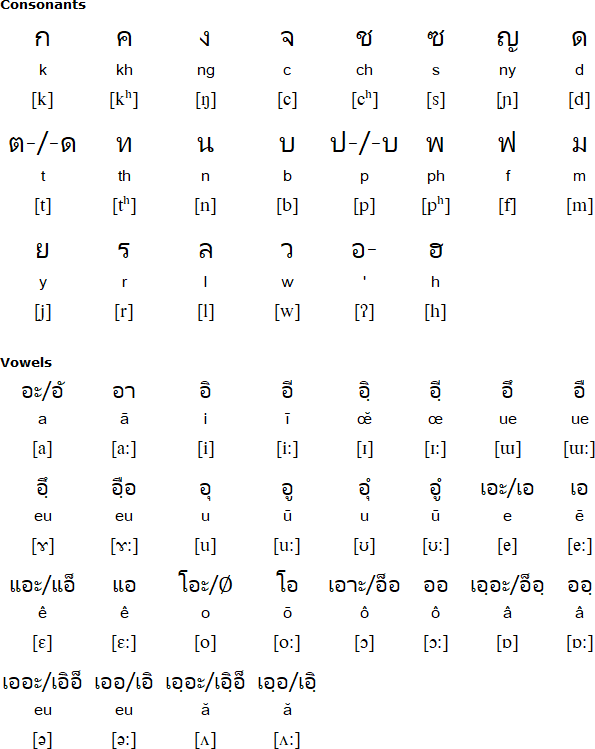Northern Khmer is a Khmer language spoken in southeastern Thailand, mainly in the provinces of Surin and Sisaket. In 2006 there were about 1.4 million speakers of Northern Khmer, which is also known as Surin Khmer, Khmer Lue, Thailand Khmer and Upper Khmer.
Speakers of Northern Khmer are said to understand other varities of Khmer more or less, but speakers of standard Khmer find Northern Khmer more difficult to follow, unless they have been exposed to it. Northern Khmer has different pronunciation, and about 80-85% of the vocabulary is cognate with standard Khmer. As a result, some linguists classify it as a separate language.
The Northern Khmer speakers are isolated from other Khmer speakers by the Dongrek Mountains, and live in an area that has been ruled, at different times, by the Lao Kingdom of Champasak, and the Kingdom of Siam. There are speakers of Lao, Thai, Kuy and other Mon-Khmer languages in the area, multilingualism is common, and the languages influence one another.
Northern Khmer is used in the media, religious services and in businesses. It is used more in towns than in cities, where Thai is more common. Northern Khmer is taught in homes and temples.
Northern Khmer is written with the Thai script in Thailand, and with the Khmer script in Cambodia. However, only about 1,000 people can read it, and 100 can write it. A Northern Khmer translation of the Bible was published in 2003.

Download an alphabet chart for Northern Khmer (Excel)
Details of the Northern Khmer alphabet provided by Wolfram Siegel
Information about Northern Khmer
https://en.wikipedia.org/wiki/Northern_Khmer_dialect
https://www.ethnologue.com/language/kxm
https://khamerlogue.wordpress.com/2010/01/15/thailands-khmer-as-invisible-minoritylanguage-ethnicity-and-cultural-politics/
https://glottolog.org/resource/languoid/id/nort2684
Akha, Bisu, Isan, Kuy, Northern Khmer, Northern Pwo, Nyah Kur, Pāli, Sanskrit, Tai Yo, Thai, Thai Song, Urak Lawoi’
Page last modified: 16.07.24
[top]
You can support this site by Buying Me A Coffee, and if you like what you see on this page, you can use the buttons below to share it with people you know.

If you like this site and find it useful, you can support it by making a donation via PayPal or Patreon, or by contributing in other ways. Omniglot is how I make my living.
Note: all links on this site to Amazon.com, Amazon.co.uk
and Amazon.fr
are affiliate links. This means I earn a commission if you click on any of them and buy something. So by clicking on these links you can help to support this site.
[top]